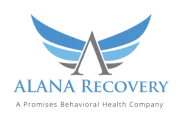Cocaine abuse is a serious problem, one that can lead to harmful physical, emotional, and social consequences. If you or someone you love is struggling with cocaine use, know that help is available. Seeking treatment through specialized programs, like cocaine rehab, can be a life-changing step toward recovery.
At ALANA Recovery in Georgia, we support you on your path to a healthier, more fulfilling life. Understanding the effects and dangers of cocaine is key to recognizing when it’s time to take action. Call 770.759.7474 to learn more about cocaine side effects and the help that’s ready for you.
What to Know About Cocaine
Cocaine is a powerful stimulant that temporarily increases energy, focus, and feelings of euphoria. Often referred to as “coke” or “blow,” it’s a commonly abused recreational drug derived from coca plant leaves. While it might create a short-lived “high,” cocaine use comes with significant risks.
Whether it’s snorted, injected, or smoked in the form of crack cocaine, the drug can harm the body and mind even after initial use. Cocaine’s effects aren’t only addictive but also potentially life-threatening.
Is Cocaine Addictive?
Yes, cocaine is highly addictive. It targets the brain’s reward center, releasing dopamine and creating feelings of pleasure. Over time, the brain craves this dopamine rush, leading to dependency.
Signs of cocaine addiction include:
- Compulsively using the drug, even when it causes harm
- Financial or legal troubles from drug use
- Needing more cocaine to get the same effects
- Withdrawal symptoms like fatigue, depression, and intense cravings
Addiction isn’t a moral failing—it’s a condition that needs professional care and support.
What Are the Dangerous Side Effects of Cocaine Abuse?
The effects of cocaine abuse can affect nearly every part of a person’s body and mind. While the drug creates short-term feelings of euphoria, its side effects can be harmful, lasting, and potentially deadly.
Short-term side effects may include an increased heart rate and blood pressure, dilated pupils with heightened sensitivity to light, reduced appetite, and dehydration. Individuals might also experience restlessness, anxiety, mood swings, irritability, or even aggression.
Long-term cocaine abuse can cause severe and lasting damage, including:
- Physical health risks – Heart attack, stroke, respiratory problems, and permanent damage to nasal tissues (if snorted)
- Mental health issues – Chronic anxiety, paranoia, and hallucinations, often referred to as “cocaine psychosis”
- Social and emotional harm – Isolation, damaged relationships, and financial ruin
Perhaps the most severe danger of cocaine abuse is the risk of overdose. Cocaine can trigger a dangerous spike in heart rate and blood pressure, leading to heart attacks or strokes. Combining cocaine with other substances, like alcohol or opioids, increases the likelihood of fatal overdoses.
How Cocaine Rehab Can Help
Recovering from cocaine abuse is tough, but with the proper support, it’s possible. A cocaine rehab program provides the structure and tools needed for lasting sobriety.
Here’s how rehab can help:
- Medical supervision – Detoxing from cocaine can cause withdrawal symptoms that require monitoring to ensure safety.
- Counseling – Programs like ALANA Recovery use therapies like cognitive-behavioral therapy (CBT) and motivational interviewing (MI) to address the root causes of addiction.
- Community support – Being around others who understand your struggles offers encouragement, accountability, and belonging.
- Life skills and aftercare – Learning healthy coping strategies and creating a recovery plan can help prevent relapse and build long-term success.
At ALANA Recovery, we take a compassionate, holistic approach to cocaine addiction. From outpatient programs to sober living support, we aim to help you heal and rebuild your life.
You’re Not Alone—Take the First Step Toward Healing with ALANA Recovery
Cocaine addiction is a difficult road, but you don’t have to walk it alone. By seeking help through ALANA Recovery, you choose hope, healing, and a path toward a better future.
If you’re ready to take the first step, call 770.759.7474 or use our online contact form. We’re here to provide the support and guidance you need to reclaim your life—starting now.

